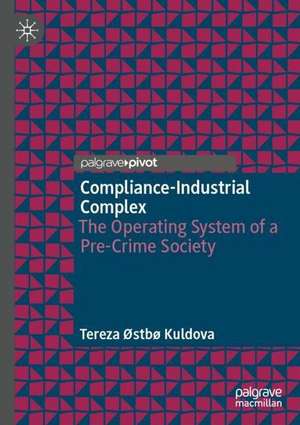Compliance-Industrial Complex: The Operating System of a Pre-Crime Society
Autor Tereza Østbø Kuldovaen Limba Engleză Hardback – noi 2022
Preț: 319.78 lei
Nou
Puncte Express: 480
Preț estimativ în valută:
61.21€ • 66.51$ • 51.45£
61.21€ • 66.51$ • 51.45£
Carte disponibilă
Livrare economică 31 martie-14 aprilie
Livrare express 15-21 martie pentru 31.75 lei
Preluare comenzi: 021 569.72.76
Specificații
ISBN-13: 9783031192234
ISBN-10: 3031192230
Pagini: 166
Ilustrații: XVIII, 166 p. 1 illus.
Dimensiuni: 148 x 210 x 18 mm
Greutate: 0.38 kg
Ediția:1st ed. 2022
Editura: Springer Nature Switzerland
Colecția Palgrave Macmillan
Locul publicării:Cham, Switzerland
ISBN-10: 3031192230
Pagini: 166
Ilustrații: XVIII, 166 p. 1 illus.
Dimensiuni: 148 x 210 x 18 mm
Greutate: 0.38 kg
Ediția:1st ed. 2022
Editura: Springer Nature Switzerland
Colecția Palgrave Macmillan
Locul publicării:Cham, Switzerland
Cuprins
Preface.- Part I. Compliance-Industrial Complex and the Anti-Policy Syndrome.- 1. Introduction to Part I: Compliance-Industrial Complex and the Anti-Policy Syndrome.- 2. The Anti-Policy Syndrome.- 3. The Compliance-Industrial Complex.- Part II. Compliance as the Operating System of a Pre-Crime Society.- 4. Introduction to Part II: Compliance as the Operating System of a Pre-Crime Society.- 5. The Pre-emption of Dissent. 6. Compliance-Industrial Complex and its Experts.- 7. Artificial Intelligence, Algorithms and the Manufacturing of Suspicion and Risk.
Recenzii
“Kuldova’s book offers a short and powerful summary of the ideology that largely supports the automation of society.” (Algorithm Watch, r.algorithmwatch.org, November 1, 2022)
Notă biografică
Tereza Østbø Kuldova is Research Professor at the Work Research Institute, OsloMet – Oslo Metropolitan University, Norway. She holds a PhD in social anthropology from the University of Oslo and is the author of How Outlaws Win Friends and Influence People (Palgrave, 2019), Luxury Indian Fashion: A Social Critique (Bloomsbury, 2016), co-editor of Crime, Harm and Consumerism (Routledge, 2020), Outlaw Motorcycle Clubs and Street Gangs (Palgrave, 2018) and Urban Utopias: Excess and Expulsion in Neoliberal South Asia (Palgrave, 2017).
Textul de pe ultima copertă
"This landmark text demonstrates how compliance measures have morphed into an entire industrial complex that is reshaping the very fabric of the regulation, governance, and policing of both ordinary workers and elite corporate actors. Frightening in some of its implications, it shows that the drab and tedious realm of compliance is something to be taken very seriously and given our undivided critical attention. Kuldova achieves the impressive feat of making an otherwise dull subject crackle with life and political urgency. Essential reading for anyone who has ever completed a mandatory e-learning course."
-Thomas Raymen, Northumbria University, UK
This is the first book to examine the growth and phenomenon of a securitized and criminalized compliance which relies increasingly on intelligence-led and predictive technologies to control future risks, crimes, and security threats. It articulates the emergence of a ‘compliance-industrial complex’ that synthesizes regulatory capitalism and surveillance capitalism to impose new regimes of power and control, as well as new forms of subjectivity subservient to the ‘operating system’ of a pre-crime society. Looking at compliance beyond frameworks of business management, corporate governance, law, and accounting, it analyses it as a social phenomenon, instrumental in the pluralization and privatization of policing, where the private intelligence, private security, and big tech companies are being concentrated at the very core of compliance, and hence, governance of the social. This critical work draws on transversal, rather than interdisciplinary, approaches and integrates disparate perspectives, inspired by works in critical criminology, critical algorithm studies, critical management studies, as well as social anthropology and philosophy.
Tereza Østbø Kuldova is Research Professor at the Work Research Institute, Oslo Metropolitan University, Norway. She is a social anthropologist and the author of How Outlaws Win Friends and Influence People (Palgrave, 2019), Luxury Indian Fashion: A Social Critique (Bloomsbury, 2016), co-editor of Crime, Harm and Consumerism (Routledge, 2020), Outlaw Motorcycle Clubs and Street Gangs (Palgrave, 2018) and Urban Utopias: Excess and Expulsion in Neoliberal South Asia (Palgrave, 2017).
-Thomas Raymen, Northumbria University, UK
This is the first book to examine the growth and phenomenon of a securitized and criminalized compliance which relies increasingly on intelligence-led and predictive technologies to control future risks, crimes, and security threats. It articulates the emergence of a ‘compliance-industrial complex’ that synthesizes regulatory capitalism and surveillance capitalism to impose new regimes of power and control, as well as new forms of subjectivity subservient to the ‘operating system’ of a pre-crime society. Looking at compliance beyond frameworks of business management, corporate governance, law, and accounting, it analyses it as a social phenomenon, instrumental in the pluralization and privatization of policing, where the private intelligence, private security, and big tech companies are being concentrated at the very core of compliance, and hence, governance of the social. This critical work draws on transversal, rather than interdisciplinary, approaches and integrates disparate perspectives, inspired by works in critical criminology, critical algorithm studies, critical management studies, as well as social anthropology and philosophy.
Tereza Østbø Kuldova is Research Professor at the Work Research Institute, Oslo Metropolitan University, Norway. She is a social anthropologist and the author of How Outlaws Win Friends and Influence People (Palgrave, 2019), Luxury Indian Fashion: A Social Critique (Bloomsbury, 2016), co-editor of Crime, Harm and Consumerism (Routledge, 2020), Outlaw Motorcycle Clubs and Street Gangs (Palgrave, 2018) and Urban Utopias: Excess and Expulsion in Neoliberal South Asia (Palgrave, 2017).
Caracteristici
Discusses important issues that are shaping governance, regulation, corporate culture and social relations Draws on anthropology and critical criminology in particular Offers thought-provoking discussions of the potential implications of the 'compliance-industrial complex'
